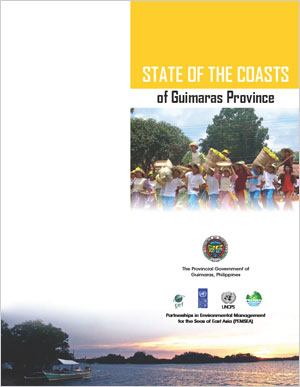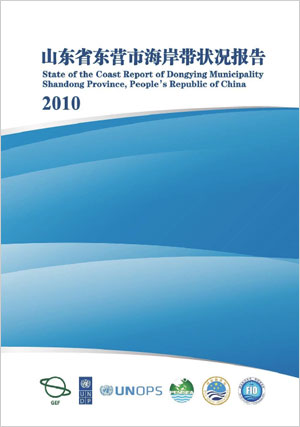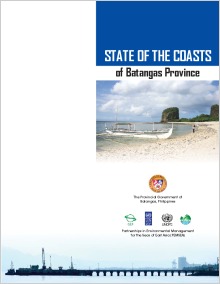
Breadcrumb
State of the Coasts of Guimaras Province
The State of the Coasts of Guimaras Province, Philippines, was developed to determine the baseline social, economic and environmental conditions and identify priority issues that will be addressed in the Integrated Coastal Management (ICM) Program of Guimaras. The SOC baseline provides the benchmark for determining the impacts of management responses and interventions on the socioeconomic and environmental status of the area. The SOC report may be developed, refined and regularly updated through time to monitor trends and changes that are occurring in the coastal areas of the province, and to refine and adapt policies, management strategies and programs in response to such changes. The report covers the period 2000 to 2009. The report is the output of the combined efforts of different stakeholders of the province, including: the national, provincial, and municipal government agencies; the academe; the private/business sector; the nongovernmental organizations (NGOs) and peoples’ organizations (POs). The data included in the report were validated through a series of field visits to the municipalities. The draft report was presented to the members of the Guimaras SOC Task Team for review and validation on 25 June 2010, the comments and recommendations of which were considered in refining the report. On 14 September 2010, the refined Guimaras SOC Baseline was presented for review, validation and concurrence of the Project Coordinating Committee (PCC).
State of the Coasts Report of Dongying 2010 (山东省东营市海岸带状况报告)
Dongying joined GEF/UNDP/PEMSEA Project on the Implementation of the Sustainable Development Strategy of Seas of East Asia (SDS-SEA) as a parallel site to develop and implement integrated coastal management (ICM) programs as early as in 2005. Since then, ICM programs were developed, tested and implemented as means to achieve the goal of balancing economic development and environmental conservation and sustainable use of valuable marine resources. The State of Coast Reporting initiated by the GEF/UNDP/PEMSEA Project in both demonstration and parallel sites across East Asian Sea region serves as a timely opportunity for Dongying to monitor and evaluate the implementation of its ICM programs in a holistic way by examining both governance and sustainable development aspects of ICM programs. The exercise also takes note of the gaps to be filled by its future programs to enable adaptive management for assured on the ground impact of the ICM programs. A total of 32 context-specific indicators are selected focusing on both governance and sustainable development. In order for the assessment team to capture the trends of sustainable coastal development, data from 2005 to 2010 are collected, compared and analyzed to determine the results of ICM implementation as attached in a table. 12 indicators are used to assess coastal governance and 20 indicators are selected in sustainable development aspects. The assessment results of governance aspect appear positive except for the partly operationalized coordination mechanism. On sustainable development aspects, it is obvious that the social and economic sustainability has been greatly strengthened and resource sustainability has improved. As to the environmental safeguard capacity, the areas of natural wetlands, the areas of cleaner sea and level of investment by private sector have markedly declined. This report informs that the future ICM of Dongying should prioritize pollution mitigation, catalyzing environmental investment and rehabilitation of natural wetland through integrated river basin and coastal area management.
State of the Coasts of Batangas Province
The State of the Coasts of Batangas Province was developed to assess the progress and impacts of ICM implementation in the Province. The report serves as the first comprehensive assessment of the Province's progress in terms of the SDCA framework, and in relation to its implementation of the Batangas Province Strategic Environmental Management Plan (2005-2020). This report was prepared through the concerted efforts of stakeholders, namely: national, provincial and municipal government agencies; nongovernment entities; the private sector; universities; and community groups. The contents of this report were validated through site visits to 10 coastal municipalities for field verification of information, and through interviews with government and nongovernment stakeholders throughout the Province. The results were reviewed and concurred by stakeholders during the final SOC workshop, which was conducted on 24 June 2008 in Batangas City, Philippines. In general, the Batangas SOC report noted positive developments in the province particularly in various governance aspects. The approach taken by the SOC and the focus on the local level provides important information on what is happening on the ground which is often not readily available. By building on strong data and monitoring system at the local level, the local SOC reports can eventually be rolled up into reliable national and regional SOC.


